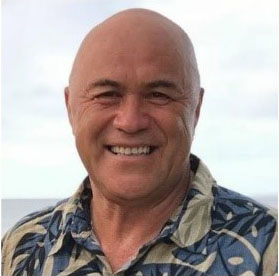Te Tuhi Kelly: Passport referendum
Thursday 9 January 2025 | Written by Te Tuhi Kelly | Published in Editorials, Opinion

Te Tuhi Kelly.
This focus on a Cook Islands passport should be mandated by us the people through a referendum.
We have over 90,000 Cook Islanders who live mainly in NZ or Australia. Many have the Cook Islands endorsement in their passports, and many born overseas but identify as Cook Islander do not. My thoughts are that a referendum should also include those Cook Islanders who live abroad especially considering the significant Cook Islands diaspora in New Zealand and Australia. The decision to push for a referendum on a Cook Islands passport is a big one, and it’s crucial that the voice of the global Cook Islands community is included.
If the goal is to ensure that the referendum reflects the views of all Cook Islanders, it makes sense to include those who live abroad. While it’s true that they may not reside in the Cook Islands, many have strong cultural, family, and emotional ties to the country.
In pushing for inclusiveness, we need to explore whether Cook Islands law permits our people living abroad to vote in national referendums. If the law doesn’t currently accommodate this, we must advocate for amendments to ensure that all Cook Islanders, regardless of their location, can participate.
Many Cook Islanders living abroad have maintained their cultural identity and connection to their roots. They still have family in the Cook Islands, many visit regularly, and hold the Cook Islands endorsement in their NZ or Australian passports.
This diaspora plays an important role in the economy, especially in terms of remittances, which are a major source of income for many families in the Cook Islands. Including them in the referendum could reflect their significant stake in the country’s future.
Many Cook Islanders living abroad consider the Cook Islands their homeland, regardless of where they were born or currently reside. Their emotional connection could be crucial in decisions regarding a Cook Islands passport, which could further strengthen their ties to their ancestral land.
By including them, we’ll be ensuring that a significant portion of the Cook Islands’ population is represented in the decision-making process. After all, 90,000+ overseas Cook Islanders is a large number, far surpassing the population in the hau kainga.
Yes, it is going to be a challenge to organise a voting system that is inclusive, and it needs to be considered. This could be done through online voting, embassies, or even mail-in ballots in areas with high concentrations of Cook Islanders.
There may be arguments against extending the right to vote to those living abroad, such as concerns about citizenship status, whether they still have ties to the Cook Islands, or if they should be eligible to vote on matters that impact only those residing on the islands. This should not matter a whit as the focus is on a Cook Islands passport and if you meet the threshold as a Cook Islander under the Immigration Act no matter where you reside, you are entitled to have a voice in a referendum.
Organising voting for those living abroad would involve a logistical challenge. The Government would need to develop a system to ensure secure voting and prevent fraud.
If current laws don’t allow for overseas participation, we need to make legislative changes to include overseas Cook Islanders. This could be a long-term goal that goes beyond this referendum, but it will make future referendums or elections more inclusive.
It is important to frame the referendum not just as a legal or political decision but also as a cultural reaffirmation of Cook Islands identity. This would resonate strongly with both those in the Cook Islands and those abroad who have an emotional connection to the country.
Given that many Cook Islanders abroad are connected through social media, using these platforms would help rally support for overseas voting rights. Running a petition or advocacy campaign online would gain momentum quickly.
The referendum needs to reflect the voice of all Cook Islanders, not just those in the Cook Islands, we do not want to create a generational grievance industry because some were excluded. The only winners would be the legal fraternity not iti tangata.
Te Tuhi Kelly
Leader of the Progressive Party














































